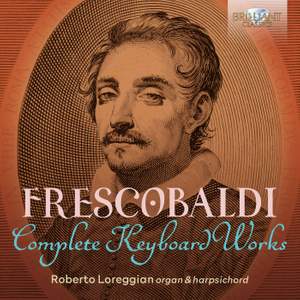Definitive recordings by the leading Frescobaldi performer of our time, now more conveniently packaged than ever.
In 2007, Roberto Loreggian embarked on a project that would see him record every published work by Girolamo Frescobaldi. Issued as a box in 2011, the Frescobaldi Edition was widely recognised as establishing a new standard of textual authority and interpretative understanding for a composer whose own works have never been as appreciated as much as their influence on his successors.
Then, in 2022, came a new set which committed to disc for the first time all the surviving unpublished music composed by Frescobaldi and recovered from obscure sources by Etienne Darbellay and Costanze Frey. All these recordings are now coupled with the keyboard collections from the earlier set, to present the most complete collection ever issued of Frescobaldi’s works for harpsichord and organ, both sacred and secular. The importance of Frescobaldi can hardly be overstated, either for his own time or subsequent generations. In his day, his fame, as modest as it may seem to us today, exceeded that of virtually all his contemporaries, except perhaps Claudio Monteverdi, and he was unrivalled as a virtuoso. Ferrara born, he became organist at St Peter’s in Rome, and attracted crowds of thousands to hear his playing. He spent seven years in Florence at the height of his career, being dissatisfied with his rewards in Rome, and wrote several collections for the Medici family, before returning to Rome.
In the genres of canzona, toccata, capriccio, partite and ricercar, Frescobaldi left many pieces that stylistically bridge lies in style the Franco-Flemish imitative polyphony of the Renaissance, and the fugal form of the Baroque age. Extravagant, ambiguous, beautiful, dramatic and sometimes exquisite, the music of Frescobaldi is the musical equivalent of the art of Caravaggio, Bernini and Pietro da Cortona. No less than them, he embodies early-Baroque genius in Italy.
Girolamo Frescobaldi (1583- 1643) was one of the most important and influential composers for the keyboard in the early 17th century. He embraced the late renaissance style in his early output, and by the end of his life had contributed some of the most impressive and influential works to the early Italian baroque.
The son of an organist, he was born in the northern city of Ferrara into a wealthy family. His employer, the Duke Alfonso II d’Este was obsessed with music, and spent several hours a day listening, spending considerable financial resources into music making at court. Young Frescobaldi obviously thrived in this environment for he soon took up employment for the Duke of Mantua, and later became organist to the Medici in Florence from 1628-34. He then went even further by moving to Rome to work for the Barberini family of Pope Urban VIII. In this elite society he mingled with such names as Gian Lorenzo Bernini and Pietro da Cortona.
Although Frescobaldi was influenced by numerous earlier composers such as the Neapolitans Ascanio Mayone and Giovanni Maria Trabaci and the Venetian Claudio Merulo, his music represents much more than a summary of its influences. Aside from his masterful treatment of traditional forms, Frescobaldi is important for his numerous innovations, particularly in the field of tempo: unlike his predecessors, he would include in his pieces sections in contrasting tempi, and some of his publications include a lengthy preface detailing tempo-related aspects of performance. This CD set presents the complete organ works and complete harpsichord works by Frescobaldi, an immense collection of Ricercars, Toccatas, Canzoni, Fantasias and Capriccios, played on historic instruments or copies of these.
Played by the eminent Italian Roberto Loreggian, an Early Music specialist with an impressive discography to his name. The recordings in this set were previously issued separately.
Critical praise for Roberto Loreggian’s Frescobaldi on Brilliant Classics:
‘Loreggian has a real gift for making the music sound as if he is improvising it – it is easy to imagine Frescobaldi himself in the room with the listener.’ Early Music Review (Unpublished works, 96154)
‘An unprecedented achievement… The sheer naturalism of Loreggian’s interpretations captivates the listener.’ Suonare News (Toccatas and Partite, 94423)





